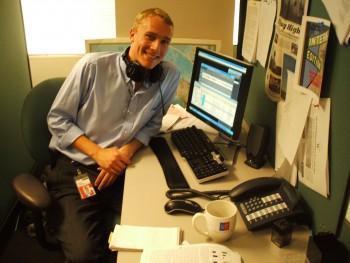Q&A: Brian Johnson '08 Takes to the Airwaves as an NPR Intern

Brian F. Johnson '08 at his NPR desk
Details
If you've been enjoying a particular story from National Public Radio's Science Desk this summer, it's very possible that Brian F. Johnson '08 had a hand in its production. Johnson was selected from hundreds of applicants to be a summer intern at NPR; from June-August, Johnson not only helped behind the scenes at Science Desk, but also produced and contributed his own stories to“Intern Edition,” a 35 minute web-based radio show and blog produced entirely by NPR's interns. Johnson recently talked to Haverford about his experience:
Haverford College: Why did you want to work at NPR? Are you a long-standing fan?
Brian F. Johnson: I'd listened to NPR since I was a kid, but didn't realize it had a section specifically for science reporting. Since I had NO experience in radio, I figured I'd try my hand in broadcasting. While I was able to produce a couple of audio pieces for my own practice, I realized how easy it was to get involved in the web.
HC: What are your responsibilities with the Science Desk?
BFJ: Fact-checking, interview-arranging, and logging (writing transcripts of audio so reporters can quickly scan them and find the quotes they want). The reporters and editors have been extremely generous with me, letting me observe them work, giving me suggestions for projects that will supplement their work. This has included web sidebars on everything from stats on state electricity conservation goals to a transcript I edited on a reporter's interview with an amputee soldier returning to Iraq.
HC: What kinds of stories have you contributed to“Intern Edition?”
BFJ: Besides the stuff mentioned above, a web sidebar for a story on the Americans with Disabilities Restoration Act. I'll be contributing an audio postcard to“Intern Edition” about a launch with a model rocket club in Maryland, and I also produced an audio slideshow on the history of our fascination with Mars. I also wrote and produced an audio profile on an engineer-cum-professional origamist (which was not played on“Intern Edition”); in addition to earning thousands of dollars for his art pieces (including a one-sheet model of a female praying mantis eating a male praying mantis), the origamist has been commissioned by a government laboratory to help design a folding pattern for a football-field sized telescope lens.
HC: How did you find out about the internship, and what was the application process?
BFJ: I mentioned to my geology professor, Bruce Saunders (at Bryn Mawr), that I was interested in pursuing science writing as a career, and he suggested I contact Faye Flam of the Philadelphia Inquirer. Faye suggested a few places I might get started, including the AAAS (American Association for the Advancement of Science) Mass Media Fellowship, meant specifically for science majors like myself. I answered some short essay questions, wrote a sample article about earthquake research in the Los Angeles area, took a phone interview a few months later, and in mid-April found out that I had not only won the fellowship (along with 13 others), but had been selected by NPR.
(On receiving the e-mail informing him that he had won): I remember my body going numb when I read the first line, something like,“Congratulations. You have been awarded the AAAS Mass Media Fellowship. Your host site will be NPR.” I was so elated…I took a run around the nature trail and nearly collapsed by the pond.
HC: What about working at NPR has been most surprising to you?
BFJ: How quickly the word“NPR” gets a response from potential interviewees. Even if I leave a phone message introducing myself as an intern on behalf of a reporter, it's not uncommon to hear back within minutes. I'll try not to get used to it.
HC: What are you enjoying most about your fellowship?
BFJ: Watching the production process, especially at the editing stage. An editor will listen to a reporter read his/her story out loud, taking notes on anything that's even slightly unclear or unsmooth. And the bar is high:“I don't think these two words go together very well. I had a little trouble envisioning that. Why don't you…” Then you'd hear it on the radio and it was flawless.
HC: How will this experience be beneficial to your future plans?
BFJ: I feel like I have a great window into the media process in terms of what makes or breaks a story pitch in the editorial meeting. (Tangibility, applicability and currency are the big ones). Plus a sense of new media (audio, web) and which stories lend themselves to which medium. And you can't beat having NPR on the resume!
Check out“Intern Edition” at www.npr.org/internedition.



